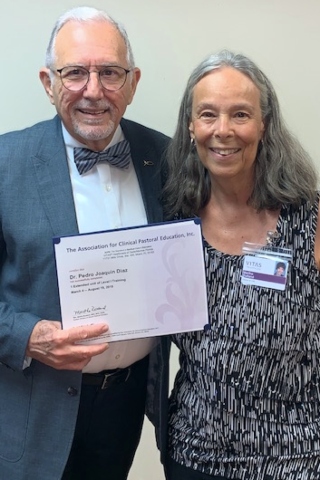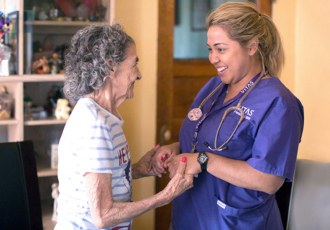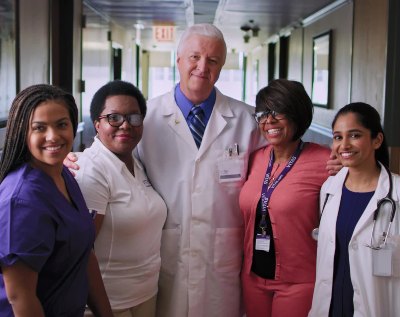Hospice Physician Explores the Interplay of Medicine, Hospice Care and Spirituality
09/19/2019

Dr. Pedro J. Diaz, a VITAS hospice physician, grew his understanding of end-of-life spirituality through a VITAS class in Clinical Pastoral Education.
When he was a young boy in Cuba, Pedro J. Diaz considered becoming a Catholic priest. He pursued a medical degree instead, driven by an interest in medicine and the desire to marry and have a family.
Dr. Diaz joined VITAS in 2009 as a hospice physician specializing in the care of terminally ill patients in their homes throughout Dade and Monroe counties.
A decade later, at age 70, he decided to continue exploring the spiritual dynamics of end-of-life care by taking a VITAS class in Clinical Pastoral Education (CPE). It’s one way employees can continue to grow through their careers with VITAS.
An Experienced Physician and Clinical Pastoral Education Student
During the nearly 20 years that he practiced internal medicine in Matanzas, Cuba, Dr. Diaz remained a deeply spiritual man. He was active in the Catholic Church, and in 1980, he helped found Caritas in Matanzas, a nongovernmental organization that provides resources and support to vulnerable Cuban citizens and families.
“Spirituality was taboo in Cuba,” Dr. Diaz says. “It was considered a forbidden subject. When I started practicing medicine, I realized that the lack of spirituality affected the population significantly, and I came to the realization that faith is as important as medicine.”
Dr. Diaz migrated to the US in 1993, and he practiced medicine in Miami from 1997-2009 before joining VITAS.
Dr. Diaz pursued the CPE course to explore the emotional and spiritual aspects of death. Typically offered to ministers and clergy, seminary students and laity, CPE focuses on knowledge of various religious and spiritual belief systems, helping attendees develop pastoral care skills within healthcare settings.
For Dr. Diaz, it meant deepening his skills as a physician who oversees the medical care of terminally ill patients and their families. Providing care in the home environment, he says, reinforced the need to understand the interplay of faith, religious beliefs and end-of-life care.
Spirituality, Death and Dying
The CPE course “opened my eyes and diversified my knowledge of the different religions and ways we can approach faith with our terminally ill patients,” says Dr. Diaz.
Martha Rutland, director of CPE at VITAS, says his presence in the class helped fellow students understand the impact of cognition on doctor-patient communication and the importance of including physical and spiritual factors in patient assessments.
“After taking the CPE course, I feel more competent and capable of helping my patients from an emotional and spiritual standpoint.”Dr. Pedro J. Diaz
“Dr. Diaz’ excitement about learning to listen more deeply to the spiritual life of patients challenges all of us to be patient listeners as well, to hear the particular and personal stories of those in our care, and to allow us to be touched by their tender places and their courageous sharing of themselves in this sacred time of life.”
Dr. Diaz now encourages other physicians to explore the influence of spirituality and beliefs on medical care, death and dying.
“Hospice counseling and spiritual guidance can be very beneficial for the patient and the family who suffers around the patient,” he says. “Faith can bring peace of mind and religious reconciliation by enhancing the search for a deeper meaning of life and one's legacy. After taking the CPE course, I feel more competent and capable of helping my patients from an emotional and spiritual standpoint.”

Choose a Career with VITAS
We offer a variety of full-time, part-time and per-diem employment opportunities. Employees earn competitive salaries and have the flexibility to choose a benefits package suitable to their own needs and lifestyle.
See Current Opportunities
